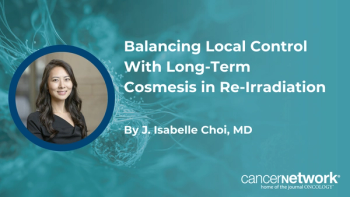
Ipatasertib Improves PFS in Advanced Triple-Negative Breast Cancer
The AKT inhibitor ipatasertib offered improved progression-free survival over placebo when combined with paclitaxel in women with triple-negative breast cancer.
The oral AKT inhibitor ipatasertib offered improved progression-free survival (PFS) over placebo when administered in combination with paclitaxel in women with locally advanced or metastatic triple-negative breast cancer (TNBC), according to a new study.
“The PI3K/AKT signaling pathway plays a crucial part in carcinogenesis, promoting cell survival and growth,” wrote study authors led by Sung-Bae Kim, MD, of the University of Ulsan College of Medicine in Seoul, South Korea. That pathway is often activated in breast cancer, and there is interest in targeting it specifically in TNBC.
Ipatasertib is a highly selective, oral, small-molecule inhibitor of AKT. Preclinical and phase I studies have shown promise in the TNBC setting, so researchers conducted a phase II randomized trial comparing it with placebo as a first-line therapy. Results of the study were
The study included 124 patients, recruited from 44 hospitals in 8 countries, divided evenly between groups receiving paclitaxel plus ipatasertib, or paclitaxel plus placebo. Patients could not have previously received systemic therapy for locally advanced or metastatic disease.
After a median follow-up of about 10 months (10.4 months in the ipatasertib group and 10.2 months in the placebo group), the study drug performed better with regard to PFS. The median PFS was 6.2 months with ipatasertib, compared with 4.9 months with placebo, for a hazard ratio (HR) of 0.60 (95% CI, 0.37–0.98; P = .037).
The researchers also conducted a subgroup analysis based on expression of PTEN, a tumor suppressor that is deficient in about half of TNBC cases. In the assessable patients, 48 were classified as PTEN low. The median PFS in the PTEN low patients was 6.2 months with ipatasertib, and 3.7 months with placebo, for an HR of 0.59 (95% CI, 0.26–1.32; P = .18).
The PFS difference appeared more pronounced in a prespecified analysis of patients with PIK3CA/AKT1/PTEN-altered tumors. In those patients, the median PFS was 9.0 months with ipatasertib compared with 4.9 months with placebo, for an HR of 0.44 (95% CI, 0.20–0.99; P = .041).
A total of 33 patients (54%) in the ipatasertib group experienced a grade 3 or higher adverse event, compared with 26 patients (42%) in the placebo group. Diarrhea was the most frequent adverse event with the study drug, occurring in 23% of patients, compared with none in the placebo group. Serious adverse events occurred in 28% of the ipatasertib patients, compared with 15% of the placebo patients.
“Our results support future assessment of ipatasertib plus paclitaxel in diseases with high prevalence of PI3K/AKT pathway activation and in particular in patients with PIK3CA/AKT1/PTEN-altered tumors,” the authors concluded. A phase III trial in metastatic breast cancer is now underway with this agent.
Newsletter
Stay up to date on recent advances in the multidisciplinary approach to cancer.












































